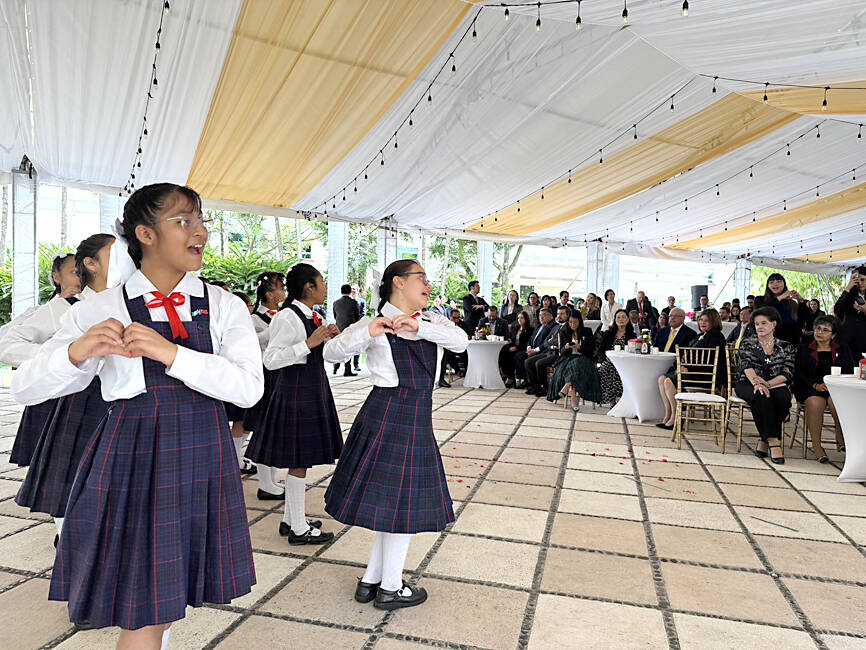Guatemala will continue its support for Taiwan through concrete action, Guatemalan Minister of Foreign Affairs Carlos Ramiro Martinez said on Wednesday at an event in Guatemala City to mark 90 years of diplomatic ties between the two countries.
Taiwan was represented by Ambassador to Guatemala Vivia Chang (張俊菲) at the event at the Guatemalan Ministry of Foreign Affairs.
The Republic of China (ROC) and Guatemala established diplomatic relations in 1934, with Taiwan establishing its first consulate general there in 1935, followed by a foreign legation in 1954 and an embassy in October 1960, Martinez said.

Photo: CNA
On Sept. 22, 2005, Taiwan and Guatemala signed a free-trade agreement, which took effect on July 1, 2006, he said.
The two countries signed a memorandum of understanding for technical cooperation on Oct. 31 last year, a basic Taiwan-Guatemala cooperation agreement in April last year and an agreement of mutual recognition in May 2021, Martinez said.
The agreements are the foundation for greater bilateral economic trade, provide opportunities for Guatemala’s exports and establish strategic partnerships across industries, he said.
Martinez thanked Taiwan for its support in education, healthcare, agriculture and other sectors.
Taiwan is not only a partner, but also a strategic investor in Guatemala’s economy, promoting growth in areas such as manufacturing, ecology and trade, Martinez said.
Taiwan and Guatemala’s 90 years of diplomatic ties have developed a comprehensive and mutually beneficial partnership, Martinez said, adding that Guatemala would continue to be a strong supporter of Taiwan.
Ninety is more than just a number — it represents a deep friendship and shared vision, Chang said.
Taiwan thanked Guatemala for supporting its admission to international organizations such as the WHO, the UN, this year’s UN Climate Change Conference and Interpol, she said.
Taiwan wants to support more bilateral cooperation with Guatemala, she said.
This year more than 60 Taiwanese firms visited the Central American nation to look for opportunities for collaboration in industries including coffee and textiles, she said.
More than 525 students from Guatemala have received vocational training in Taiwan or participated in exchange programs, adding to the bilateral friendship, she said.
Traditional dancers organized by the Guatemala Institute of Tourism, a lion dance organized by the Taipei-based Overseas Chinese Association and a group of local students singing Tian Mi Mi (甜蜜蜜) and The Moon Represents My Heart (月亮代表我的心) performed at the event.

AGING: As of last month, people aged 65 or older accounted for 20.06 percent of the total population and the number of couples who got married fell by 18,685 from 2024 Taiwan has surpassed South Korea as the country least willing to have children, with an annual crude birthrate of 4.62 per 1,000 people, Ministry of the Interior data showed yesterday. The nation was previously ranked the second-lowest country in terms of total fertility rate, or the average number of children a woman has in her lifetime. However, South Korea’s fertility rate began to recover from 2023, with total fertility rate rising from 0.72 and estimated to reach 0.82 to 0.85 by last year, and the crude birthrate projected at 6.7 per 1,000 people. Japan’s crude birthrate was projected to fall below six,

US President Donald Trump in an interview with the New York Times published on Thursday said that “it’s up to” Chinese President Xi Jinping (習近平) what China does on Taiwan, but that he would be “very unhappy” with a change in the “status quo.” “He [Xi] considers it to be a part of China, and that’s up to him what he’s going to be doing, but I’ve expressed to him that I would be very unhappy if he did that, and I don’t think he’ll do that. I hope he doesn’t do that,” Trump said. Trump made the comments in the context

SELF-DEFENSE: Tokyo has accelerated its spending goal and its defense minister said the nation needs to discuss whether it should develop nuclear-powered submarines China is ramping up objections to what it sees as Japan’s desire to acquire nuclear weapons, despite Tokyo’s longstanding renunciation of such arms, deepening another fissure in the two neighbors’ increasingly tense ties. In what appears to be a concerted effort, China’s foreign and defense ministries issued statements on Thursday condemning alleged remilitarism efforts by Tokyo. The remarks came as two of the country’s top think tanks jointly issued a 29-page report framing actions by “right-wing forces” in Japan as posing a “serious threat” to world peace. While that report did not define “right-wing forces,” the Chinese Ministry of Foreign Affairs was

PREPAREDNESS: Given the difficulty of importing ammunition during wartime, the Ministry of National Defense said it would prioritize ‘coproduction’ partnerships A newly formed unit of the Marine Corps tasked with land-based security operations has recently replaced its aging, domestically produced rifles with more advanced, US-made M4A1 rifles, a source said yesterday. The unnamed source familiar with the matter said the First Security Battalion of the Marine Corps’ Air Defense and Base Guard Group has replaced its older T65K2 rifles, which have been in service since the late 1980s, with the newly received M4A1s. The source did not say exactly when the upgrade took place or how many M4A1s were issued to the battalion. The confirmation came after Chinese-language media reported